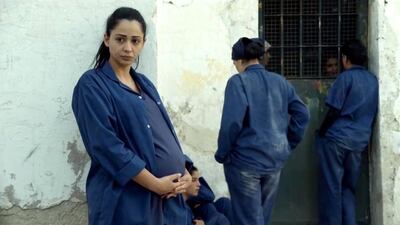The new Palestinian film, 3,000 Nights, fictionalises a story that has been told countless times in real life: the experience of being a political prisoner in Israel.
As many as a million Palestinian prisoners of conscience have been detained or jailed by Israel since 1948, according to figures released by the Palestinian ministry of detainees.
The first feature film by Mai Masri, 3,000 Nights sheds light on the experience of women prisoners – who comprise the minority of detainees, numbering about 12,000 – since 1967.
Through beautiful and haunting cinematography, Masri brings to life the fictional story of Layal (played by Maisa Abd Elhadi), a newly-wed who in the early 1980s landed in jail after innocently giving a lift to a young Palestinian who allegedly launched an attack on an Israeli checkpoint.
She lands up in a cell in Ramla prison with Israeli women implicated in criminal cases, which causes the Palestinian women prisoners to suspect that she is an informant or collaborator.
It is only when she is transferred to a Palestinian cell and reveals to her cellmates her shocking discovery that she is pregnant that the suspicion begins to disappear. Her cellmates’ heart melts when she gives birth to Nour (played by Zaid Qoda). Although this seems to be a contrived plot, there are instances of similar real-life incidents. One case involved a woman from Gaza whose son spent the first 21 months of his life in prison with her. However, she was arrested for being a member of Islamic Jihad and admitted to planning to carry out an attack.
Despite many moving moments, the characters in the film seemed incomplete. As with traditional Arab films that explore political themes, 3,000 Nights is high on symbolism, but it fails to delve into the psychological depths of characters.
To project complex characters as symbols necessitates some simplistic caricaturing. The film misses many of the ambiguities of the human experience.
Pretty much all the Palestinians in the film are beautiful or have gravitas, or both, especially in the case of the lead characters. In comparison, the Israelis are shown as ugly-natured and hostile. The only exceptions are the human-rights lawyer defending Layal and a Mizrahi Jewish inmate, who become sympathetic to Layal, presumably due to their shared Arab roots.
That said, the film more or less depicts accurately the daily realities faced by Palestinian prisoners, from those tempted to become informants to those who remain committed to their cause. Some of the film’s most amusing scenes relate to the methods prisoners use to communicate secretly with each other, including Morse code, sign language and concealed holes on walls.
The film also features hunger-strikes, an issue that has been high on the Palestinian public consciousness with the recent real-life case of Muhammad Al Qiq, who almost died after he refused food for 94 days to protest his detention without charge.
In 3,000 Nights, the Palestinian inmates undertook a mass hunger-strike to protest against conditions. Sulaiman Khatib took part in several such strikes in the 1980s. “In jail, there was nothing for free,” Khatib told me in Ramallah. “So we had to engage in nonviolent activities, such as hunger striking, so that we could improve our daily conditions.”
Given their serious consequences on the prisoners’ health, hunger strikes were not taken lightly by the prisoners, who used psychological tricks to endure those gruelling days. “Food controls your thoughts and dreams,” Khatib said, as he sipped on his coffee. “There’s a rule for hunger strikers: you’re not allowed to talk about food.”
Another strategy was to forge a sense of solidarity among prisoners and with their supporters beyond the prison walls. “This is wonderful as you become one with the group,” observed Suleiman, a former prisoner.
One surprising effect of a hunger-strike, I learnt, is that as the body declines, the spirit soars. “You begin to believe you’re a legend, you’re extraordinary, you have superpowers,” Bassam Arameen, who was also a political prisoner in the 1980s, recalled.
Many Palestinians describe their time in prison as a kind of school, in which they immersed themselves in reading, learning, debate and reflection.
Many former prisoners I have spoken to also recall how their time in prison radically altered their view of the path to Palestinian liberation and made them view Israelis more humanely – not in a Stockholm syndrome, but in a Nelson Mandela kind of way.
“Before I knew about Gandhi or Mandela, I learnt with the other prisoners that non-violence works because most of our hunger strikes succeeded,” Khatib said.
Khaled Diab is a Belgian-Egyptian freelance journalist in Jerusalem

